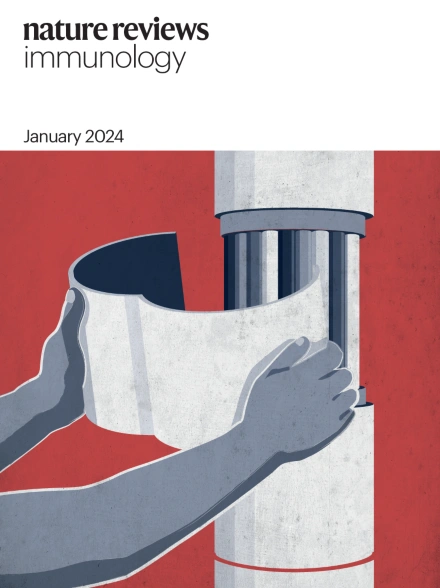CD8+ T细胞耗竭的调节因子。
IF 60.9
1区 医学
Q1 IMMUNOLOGY
引用次数: 0
摘要
T细胞衰竭是一种适应性和独特的细胞命运,主要发生在慢性感染和癌症中,是对持续抗原刺激的反应。它的特点是效应功能的逐渐丧失和多个抑制受体的持续表达。T细胞耗竭的进展是由通过T细胞受体的持续抗原刺激驱动的,并由来自共刺激和抑制分子的信号以及微环境因素(如细胞因子、代谢物和神经元因子)调节。这些外源性细胞因子通过关键的内在细胞调节因子重塑T细胞转录组、表观基因组和代谢,使其达到衰竭状态。在这篇综述中,我们总结了我们目前对参与T细胞衰竭的调节因子的理解,强调了它们在指导不同的衰竭T细胞亚群的命运和功能中的作用,以及如何利用它们来开发针对癌症和慢性感染的改进免疫疗法。本文章由计算机程序翻译,如有差异,请以英文原文为准。
Regulators of CD8+ T cell exhaustion.
T cell exhaustion is an adaptive and distinct cell fate that emerges in response to persistent antigen stimulation, primarily in chronic infections and cancer. It is characterized by a progressive loss of effector functions and sustained expression of multiple inhibitory receptors. Progression to T cell exhaustion is driven by persistent antigen stimulation through the T cell receptor and is modulated by signals from co-stimulatory and inhibitory molecules as well as by microenvironmental factors such as cytokines, metabolites and neuronal factors. These extrinsic cellular factors reshape the T cell transcriptome, epigenome and metabolism towards a state of exhaustion through critical intrinsic cell regulators. In this Review, we summarize our current understanding of the regulators involved in T cell exhaustion, highlighting their roles in directing the fates and functionalities of distinct exhausted T cell subsets and how they may be harnessed for the development of improved immunotherapies against cancer and chronic infections.
求助全文
通过发布文献求助,成功后即可免费获取论文全文。
去求助
来源期刊

Nature Reviews Immunology
医学-免疫学
CiteScore
93.40
自引率
0.40%
发文量
131
审稿时长
6-12 weeks
期刊介绍:
Nature Reviews Immunology is a journal that provides comprehensive coverage of all areas of immunology, including fundamental mechanisms and applied aspects. It has two international standard serial numbers (ISSN): 1474-1733 for print and 1474-1741 for online. In addition to review articles, the journal also features recent developments and new primary papers in the field, as well as reflections on influential people, papers, and events in the development of immunology. The subjects covered by Nature Reviews Immunology include allergy and asthma, autoimmunity, antigen processing and presentation, apoptosis and cell death, chemokines and chemokine receptors, cytokines and cytokine receptors, development and function of cells of the immune system, haematopoiesis, infection and immunity, immunotherapy, innate immunity, mucosal immunology and the microbiota, regulation of the immune response, signalling in the immune system, transplantation, tumour immunology and immunotherapy, and vaccine development.
 求助内容:
求助内容: 应助结果提醒方式:
应助结果提醒方式:


